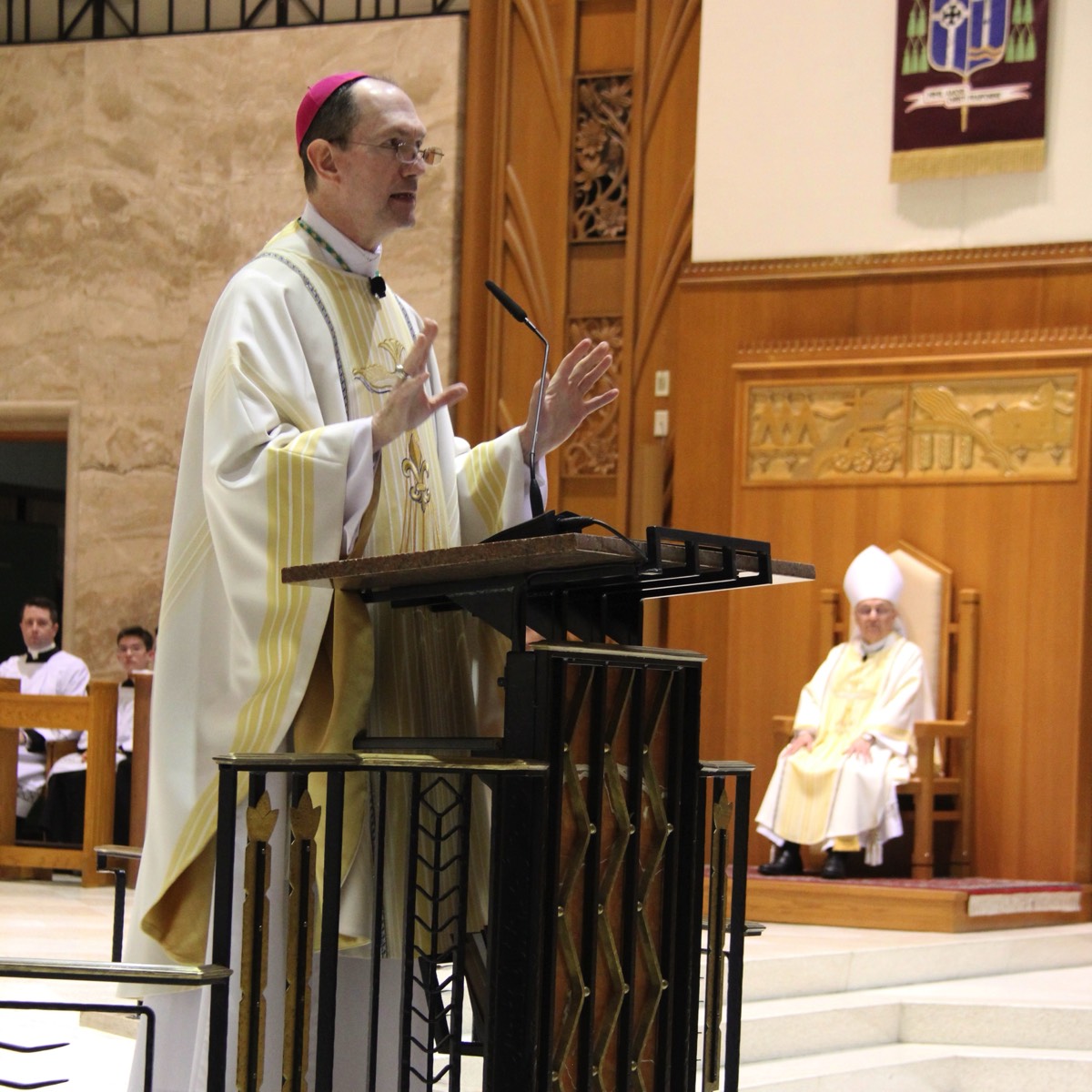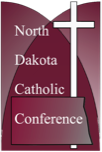
| Homily of Bishop John T. Folda for Legislators and Elected Officials |
Bishop Kagan, dear Fathers, and dear friends: It’s good to be with you, and I’m honored to share a few thoughts with you this evening for this Legislative Mass and dinner. I know how precious your time is during the legislative session, so thank you for joining us for this time of prayer. I grew up in a parish named for St. Thomas More, a layman who was the chief minister to the king of England. He held great civil power, but he was also a man of deep prayer, and for him God always came first. I think we can all learn from his example.
It is often observed these days that our nation and our society have become highly polarized. It’s an “us versus them” mentality on everything, and if you’re not with me, you’re against me, you’re cancelled. Clearly, that doesn’t conform to the teaching and example of Jesus, who commanded us to “love your enemies and pray for those who persecute you.” The world hears those words, and thinks “how ridiculous, how unrealistic.” Our culture can’t comprehend a notion of loving an enemy or an opponent. It can’t imagine going the extra mile, turning the other cheek, or giving away our cloak. But that’s the way of Christ, and he lived it out all the way to the cross, where he forgave his enemies and redeemed all of us from our sins. I would like to think that here in North Dakota, we do things a little differently, a little better, that we’re a bit more Christ-like. But of course, we too are touched by original sin, and it’s easy to fall into the ways of the world, to give in to the temptation of resentment, hatred, and revenge, especially with those who are our opponents, or those who just have a different opinion than ours.
Jesus is calling all of us to a higher standard, the standard of forgiveness and charity, which means desiring good for the other. For you who are legislators and for all who are involved in government and public service, this should be a constant goal, to sincerely seek the good of others, even when we differ, even when there is nothing to be gained but a favorable glance from our Lord. As Thomas More said, “Not a bad audience, that.”
To be in government, in any kind of public service, is a high calling, a call to look on every person with respect and even reverence. It is a call to do what can be done to serve the needs of others, to alleviate suffering, to heal injustice, and to reach out to those on the margins. It is a call to uphold the truth, especially the truth of the dignity of the human person, to defend the most vulnerable, even to endure the scorn of those who disagree and dislike us. And there will always be those who disagree and maybe dislike us. But once again, Jesus summons us to a spirit of charity, a spirit of forgiveness, a spirit of reconciliation. In short, he calls us to perfection. “So be perfect, just as your heavenly Father is perfect.”
The call to perfection is daunting for any of us. And in the world of politics, maybe this exhortation would get nothing more than a scornful laugh from some observers. But Jesus doesn’t say, “Be perfect, unless you’re in politics.” On the contrary, the call to perfection, the call to be one with God in our intentions and our actions, is even more necessary in the world of politics and government, because so much is at stake. The lives of others are profoundly impacted by the decisions of those entrusted with public authority, and I believe our Lord summons us to use our positions to make the lives of our neighbors better, more peaceful, safer.
There are some who look with suspicion and disdain on politics, and perhaps the world of politics has given them good reason at times. But Pope Francis has a different vision. He says, “Once more, I appeal for a renewed appreciation of politics as a lofty vocation and one of the highest forms of charity, inasmuch as it seeks the common good.” In your current role of responsibility, you have the capacity to do much good and to put into effect what Francis and other popes have called “a politics of love.”
Politics and government must at times be pragmatic. What is feasible, what can we accomplish with what we have? But Pope Francis reminds us to lift our eyes above the merely pragmatic. He says, “In political activity, we should remember that…every person is immensely holy and deserves our love. Consequently, if I can help at least one person have a better life, that already justifies the offering of my life.” And isn’t that the message of Jesus as well? “There is no greater love than this, that one should lay down his life for his friends.” In all of your efforts and deliberations, and with all the sacrifices that you do make, remember the words of Jesus: “Whatever you did for the least of my brethren, you did it for me.”
It is a principle of Christian spirituality that we are called to be divinized, to be perfect, to be one with God so that we can share in the divine life of God. But we reach that perfection when we learn to forgive as God forgives, and to love as God loves. Dear friends, in your roles as leaders and public servants, may you receive the grace you need to show mercy, to forgive offenses, and to recognize the face of Christ in others, especially those most in need. You can be confident that Christ in his generosity is offering you the grace you need to carry the great responsibilities of your office. And you can also be assured of our prayers.
Bishop John T. Folda, Bishop of Fargo
Mass for Legislators and Elected Officials
February 9, 2023
Holy Spirit Cathedral, Bismarck
It is often observed these days that our nation and our society have become highly polarized. It’s an “us versus them” mentality on everything, and if you’re not with me, you’re against me, you’re cancelled. Clearly, that doesn’t conform to the teaching and example of Jesus, who commanded us to “love your enemies and pray for those who persecute you.” The world hears those words, and thinks “how ridiculous, how unrealistic.” Our culture can’t comprehend a notion of loving an enemy or an opponent. It can’t imagine going the extra mile, turning the other cheek, or giving away our cloak. But that’s the way of Christ, and he lived it out all the way to the cross, where he forgave his enemies and redeemed all of us from our sins. I would like to think that here in North Dakota, we do things a little differently, a little better, that we’re a bit more Christ-like. But of course, we too are touched by original sin, and it’s easy to fall into the ways of the world, to give in to the temptation of resentment, hatred, and revenge, especially with those who are our opponents, or those who just have a different opinion than ours.
Jesus is calling all of us to a higher standard, the standard of forgiveness and charity, which means desiring good for the other. For you who are legislators and for all who are involved in government and public service, this should be a constant goal, to sincerely seek the good of others, even when we differ, even when there is nothing to be gained but a favorable glance from our Lord. As Thomas More said, “Not a bad audience, that.”
To be in government, in any kind of public service, is a high calling, a call to look on every person with respect and even reverence. It is a call to do what can be done to serve the needs of others, to alleviate suffering, to heal injustice, and to reach out to those on the margins. It is a call to uphold the truth, especially the truth of the dignity of the human person, to defend the most vulnerable, even to endure the scorn of those who disagree and dislike us. And there will always be those who disagree and maybe dislike us. But once again, Jesus summons us to a spirit of charity, a spirit of forgiveness, a spirit of reconciliation. In short, he calls us to perfection. “So be perfect, just as your heavenly Father is perfect.”
The call to perfection is daunting for any of us. And in the world of politics, maybe this exhortation would get nothing more than a scornful laugh from some observers. But Jesus doesn’t say, “Be perfect, unless you’re in politics.” On the contrary, the call to perfection, the call to be one with God in our intentions and our actions, is even more necessary in the world of politics and government, because so much is at stake. The lives of others are profoundly impacted by the decisions of those entrusted with public authority, and I believe our Lord summons us to use our positions to make the lives of our neighbors better, more peaceful, safer.
There are some who look with suspicion and disdain on politics, and perhaps the world of politics has given them good reason at times. But Pope Francis has a different vision. He says, “Once more, I appeal for a renewed appreciation of politics as a lofty vocation and one of the highest forms of charity, inasmuch as it seeks the common good.” In your current role of responsibility, you have the capacity to do much good and to put into effect what Francis and other popes have called “a politics of love.”
Politics and government must at times be pragmatic. What is feasible, what can we accomplish with what we have? But Pope Francis reminds us to lift our eyes above the merely pragmatic. He says, “In political activity, we should remember that…every person is immensely holy and deserves our love. Consequently, if I can help at least one person have a better life, that already justifies the offering of my life.” And isn’t that the message of Jesus as well? “There is no greater love than this, that one should lay down his life for his friends.” In all of your efforts and deliberations, and with all the sacrifices that you do make, remember the words of Jesus: “Whatever you did for the least of my brethren, you did it for me.”
It is a principle of Christian spirituality that we are called to be divinized, to be perfect, to be one with God so that we can share in the divine life of God. But we reach that perfection when we learn to forgive as God forgives, and to love as God loves. Dear friends, in your roles as leaders and public servants, may you receive the grace you need to show mercy, to forgive offenses, and to recognize the face of Christ in others, especially those most in need. You can be confident that Christ in his generosity is offering you the grace you need to carry the great responsibilities of your office. And you can also be assured of our prayers.
Bishop John T. Folda, Bishop of Fargo
Mass for Legislators and Elected Officials
February 9, 2023
Holy Spirit Cathedral, Bismarck
What We Do
The North Dakota Catholic Conference acts on behalf of the Roman Catholic bishops of North Dakota to respond to public policy issues of concern to the Catholic Church and to educate Catholics and the general public about Catholic social doctrine.

Contact Us
North Dakota Catholic Conference
103 South Third Street, Suite 10
Bismarck, North Dakota
58501
1-888-419-1237
701-223-2519
Contact Us

